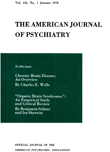STUDIES IN HUMAN ECOLOGY
Abstract
Our inferences from our studies are these: man's relation to his social environment as perceived by him has a profound effect upon his general health. It influences the development and progression of all forms of illness, regardless of their nature, and regardless of the influence of other etiological factors. Its effect often far outweighs the influence of changes in the physical environment and the effects of random exposure to pathogenic or noxious agents. As a group, those who are experiencing difficulty in adapting to their social environment have a disproportionate amount of all of the illness which occurs among the adult population.
Access content
To read the fulltext, please use one of the options below to sign in or purchase access.- Personal login
- Institutional Login
- Sign in via OpenAthens
- Register for access
-
Please login/register if you wish to pair your device and check access availability.
Not a subscriber?
PsychiatryOnline subscription options offer access to the DSM-5 library, books, journals, CME, and patient resources. This all-in-one virtual library provides psychiatrists and mental health professionals with key resources for diagnosis, treatment, research, and professional development.
Need more help? PsychiatryOnline Customer Service may be reached by emailing [email protected] or by calling 800-368-5777 (in the U.S.) or 703-907-7322 (outside the U.S.).



